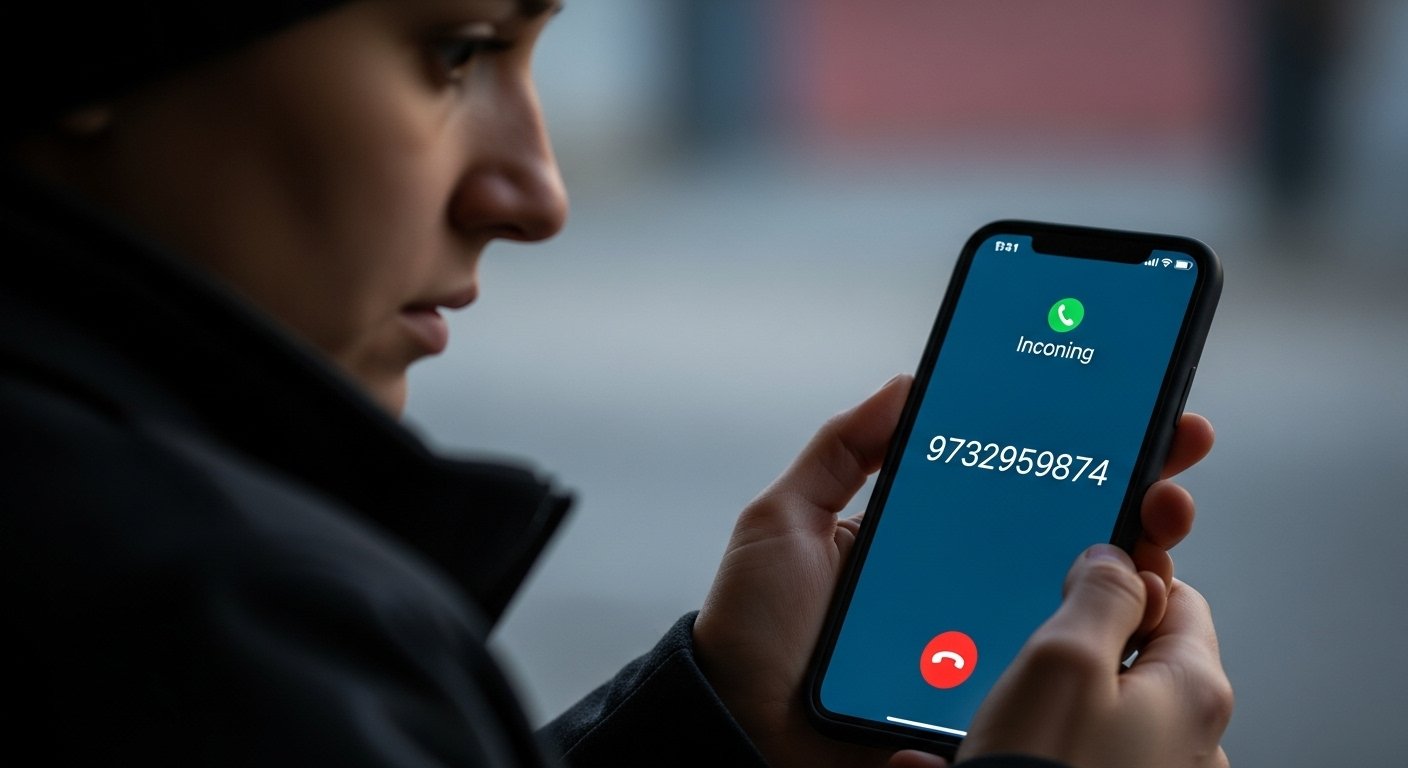It rings, you pick it up, and your screen displays a sequence of numbers you don’t recognize. “9732959874.” Your mind races. Is it an important call you’ve been waiting for? A wrong number? Or something more concerning? This scenario is all too common in our connected world. We are constantly reachable, but this accessibility comes with a downside: the anxiety of the unknown caller.
This article isn’t just about the specific digits 9732959874. It’s about understanding the nature of these calls, the potential risks they pose, and the practical steps you can take to regain control of your phone and your peace of mind. We will explore the world of modern telecommunication, where calls can originate from a variety of sources, not all of them benign. By the end, you’ll be equipped with the knowledge to handle any unknown number with confidence.
What is 9732959874? Decoding the Number
The number 9732959874 follows the standard North American Numbering Plan (NANP). The “973” area code is a legitimate geographic code assigned to Northern New Jersey, covering major cities like Newark, Jersey City, and Paterson. This means the number is registered as being from that region. However, in today’s digital age, this information can be deceiving.
Scammers and telemarketers have mastered the art of “spoofing.” Caller ID spoofing allows a caller to deliberately falsify the information transmitted to your caller ID display. They can make it appear as if the call is coming from a local number, a government agency, or even a trusted company. The person calling from 9732959874 might not be in New Jersey at all; they could be anywhere in the world. This tactic is used to increase the likelihood that you will answer the call, as people are more inclined to pick up a local number.
Common Types of Calls from Unknown Numbers
Understanding the motives behind these calls is the first step in dealing with them. Calls from numbers like 9732959874 generally fall into a few categories:
Telemarketing and Robocalls
This is one of the most frequent sources of unsolicited calls. Automated systems, or “robocalls,” dial thousands of numbers per hour to deliver pre-recorded messages. These can range from legitimate (but annoying) sales pitches for vacation packages or credit card offers to outright scams.
Phishing and Scam Attempts
These are malicious calls designed to trick you into revealing personal or financial information. The caller might pretend to be from the IRS, your bank, a tech support service, or even a lottery company. Their goal is to create a sense of urgency or fear to manipulate you into giving up sensitive data like your Social Security number, bank account details, or passwords.
Debt Collection
Sometimes, an unknown number could be a debt collector trying to reach someone. They may have acquired your number from an old application or by mistake. It’s important to know your rights under the Fair Debt Collection Practices Act (FDCPA) if you believe the call is in error.
Simple Wrong Numbers
Of course, sometimes a call from a number like 9732959874 is just an honest mistake. Someone may have misdialed, and you happened to be the recipient of their error.
The Real Risks of Answering Unknown Calls
While a wrong number is harmless, the risks associated with scam calls are significant. Engaging with a fraudulent caller can lead to several negative outcomes.
Financial Loss
This is the most direct risk. Scammers are adept at social engineering, convincing people to wire money, purchase gift cards, or provide credit card information. Once the money is sent, it is almost always impossible to recover.
Identity Theft
By gleaning just a few key pieces of information, a skilled scammer can commit identity theft. They might use your name, address, and Social Security number to open new credit lines, file fraudulent tax returns, or make unauthorized purchases, causing long-term damage to your credit and financial health.
Data Compromisation
Even if you don’t give out information, sophisticated scammers can sometimes exploit vulnerabilities just by having you on the line. They may try to send malicious links via SMS or guide you to a fraudulent website designed to install malware on your device.
How to Protect Yourself and Respond
You don’t have to live in fear of your phone ringing. By adopting a few smart habits, you can effectively filter out unwanted calls and protect your information.
Proactive Defense Strategies
The best approach is to prevent these calls from bothering you in the first place.
Use Your Phone’s Built-in Features
Most modern smartphones have features to silence unknown callers. On iPhones, you can enable “Silence Unknown Callers” in the settings, which sends all calls from numbers not in your contacts straight to voicemail. Android phones have similar features, often called “Call Screening” or “Block Unknown Callers.”
Register with the National Do Not Call Registry
While it won’t stop scammers who operate outside the law, adding your number to the National Do Not Call Registry can reduce the number of legitimate telemarketing calls you receive. It’s a simple and free process.
Consider a Third-Party Call-Blocking App
Several reputable apps specialize in identifying and blocking spam calls. They use vast databases of reported numbers to warn you of a potential “Spam Risk” before you even answer.
What to Do If You Answer
If you do pick up a call from 9732959874 or any other suspicious number, follow these rules.
1. Do Not Engage
If you suspect it’s a scam, the single most important rule is to hang up immediately. Do not press any buttons, even if prompted to “press 1 to be removed from the list,” as this can confirm your number is active.
2. Never Give Out Personal Information
Legitimate organizations will never call you out of the blue to ask for sensitive information like passwords, PINs, or your Social Security number. If you’re unsure, hang up and call the company back using a verified phone number from their official website or your account statement.
3. Trust Your Instincts
If a call feels “off,” it probably is. High-pressure tactics, too-good-to-be-true offers, and threats of immediate arrest are all hallmarks of a scam.
Conclusion: Taking Back Control
The number 9732959874 is a single data point in a vast ocean of digital communication. It serves as a reminder that while technology connects us, it also requires us to be vigilant. You are the gatekeeper of your own privacy and security. By understanding the tactics used by unscrupulous callers and implementing the protective strategies outlined here, you can transform your phone from a source of anxiety back into a tool of convenience.
Stop treating every unknown call as a potential emergency. Use your phone’s technology to your advantage, be skeptical of unsolicited requests, and never feel pressured to respond. Your time, your money, and your personal information are far too valuable to hand over to a stranger on the other end of the line.
Frequently Asked Questions (FAQs)
1. Is 9732959874 definitely a scam number?
Not necessarily. While it has been reported by users as a source of spam and robocalls, it could also be a telemarketer or a wrong number. The key is to be cautious and not assume it’s a legitimate call without verification.
2. What should I do if I accidentally gave information to a caller from this number?
If you provided financial information, contact your bank or credit card company immediately to report the fraud and secure your accounts. If you gave out personal details like your SSN, consider placing a fraud alert on your credit reports with the three major bureaus.
3. Can I block the number 9732959874?
Yes, you can manually block the number on both iPhone and Android devices. However, because scammers often use number spoofing, they may call again from a different number. Using a network-level or app-based blocking solution is more effective.
4. Why do I keep getting calls from different numbers with the same area code?
This is a common tactic known as “neighbor spoofing,” where scammers use local area codes to trick you into answering. They know you’re more likely to pick up a call that appears to be from your own community.
5. Are there any legitimate reasons to get a call from an unknown number?
Yes. It could be a call from a doctor’s office, a school, a delivery person, or a business you’ve recently contacted. The difference is that these legitimate callers will usually leave a detailed voicemail if you don’t answer. Scammers often do not.

